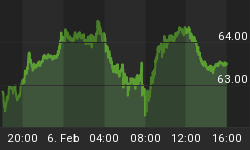Is the 6-year cycle peaking already? That's the opinion of at least one respected colleague who sees the market as having reached its apex in the interim earlier this year. The chart of the S&P 500 (SPX) index below - if the parabolic structure follows through - would seem to confirm this assessment.

One major piece of anecdotal evidence that the broad market is undergoing a pivotal topping process is the current rage in America and in other countries for poker and other casino-style gambling games.
For instance, an article appearing over the AP news wire this weekend headlined "Newsstands flush with poker magazines" spoke of the popularity of Texas "hold 'em" and other high stakes card games and how it has created a plethora of magazines aimed at luring younger players into the gambling mania. This is typical of a mania - it requires constant advertisement and propaganda to bring in new participants in order to keep the mania alive.
But if you thought the Internet stock mania of the late '90s was extreme, or even the current real estate bubble, the poker craze is the apotheosis of speculative insanity. It is gambling and speculative mania at its essence without any of the trappings of respectability that may attend other manias (at least superficially). As Michael Mainelli, professor of commerce at Gresham College in London has put it, "Betting markets are clearly coming to resemble other financial markets."
Betfair, a London-based online gambling concern, is the world's largest online poker operator with daily betting volumes often exceeding the volume of trade on the London Stock Exchange. As John Gapper of the London Financial Times recently noted, "The development of financial markets in the past decade has demonstrated [that] falling trading costs lead to rising volumes. As it becomes easier and cheaper to make bets, all kinds of unexpected trading approaches - both to take risk and to offset other exposures - are unleashed." In other words, gambling begets gambling until massive speculative bubbles are created. What we are witnessing is yet another bubble in the making!
To paraphrase what a colleague recently told me, "The gambling craze is the last gasp manifestation of the average person's attempt at keeping up his current lifestyle by increasing returns when every other investment vehicle has proven insufficient."
And what recourse will those citizens have who are badly burned in this gambling mania (which is inevitable)? They certainly won't be able to redress their grievances to the government as both state and national governments are active supporters of gambling (whether in the form of state lotteries or, in the case of national governments, as an endorser or authorizing agent of various online betting endeavors).
In light of the gambling insanity sweeping the world, I can't help but think of a line spoken in the famous Japanese samurai film, "Yojimbo," by Toshiro Mifune: "Gamblers...pretty nice to be rid of them!"
There are two bromides worth mentioning here: "What's bad for GM is bad for the U.S. economy," and "What's good for oil is bad for stocks and the economy." These statements hardly need clarifying as the recent GM woes are only too well documented. Just recently, GM, Ford and other automakers have resorted to extreme discounting tactics in an attempt at luring buyers. This is part and parcel of deflation, viz., competitive undervaluation out of sheer desperation.
Samuel J. Kress of SJK Capital drew attention to this facet of K-wave deflation that we're now experiencing. In his Special Edition V he wrote, "The excesses that accrued during the past half century beginning with the economic/market super cycle and the post World War II expansionary economic boom have begun to be reduced since the terminal high of 2000. The system is being purged, and is evident in the public, private and corporate sectors. The three basic assets in life - financial, physical and human - are contracting: debt is being reduced; plants are being sold or closed; jobs are being replaced by machines and by exportation of our manufacturing base to developing countries. Clearly, this is liquidation in its infancy which is the forerunner of deflation, the precursor of the terminal series - depression, war and revolution."
This purgation of the system is nowhere more evident than the recent high-profile trial and conviction of former WorldCom CEO Bernie Ebbers. I recall from my early readings of Wall Street history that whenever corporate scandals and systemic corruption is brought out in the headlines in the form of show trials, etc., it usually coincides with a top. Will this time prove to be any different?















